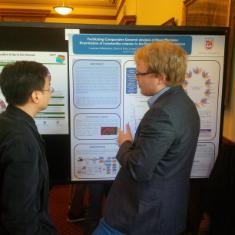Research
Bioinformatics Research @ LUC: Hands-on experience with current topics and tools within the field, developing real-world skills applicable in a data-driven environment, is part of all degrees within the Bioinformatics Program. Check out some of the publications of Bioinformatics faculty and students at Loyola's eCOMMONS!
BS Bioinformatics Research: Majors are required as part of their curriculum to engage in hypothesis driven research. While only required to conduct research for one semester, the majority of our majors are involved in research for several years. These multi-year experiences provide the student with the opportunity to more fully experience research—all of its highs and its many lows. Significant research experiences provide the student with a taste of what research-intensive graduate programs will be like. Moreover, they are regarded highly by prospective graduate/medical school admissions committees as well as potential employers. Research experiences can be conducted either on campus with one of the Loyola Bioinformatics faculty or at another institution. Once you have established your research mentor, you will need to register for Research.
MS Bioinformatics Research: MS Bioinformatics majors are required to either conduct hypothesis driven work (Thesis option) or develop real-world skills through an internship (Non-thesis option).
Researchers @ LUC
Bioinformatics majors engage in research in several labs here at the Lakeside campus as well as our Health Sciences campus.

Bioinformatics/Biology double major Larry Kalesinskas presents his research into the genomic differences of Lactobacillus crispatus genomes from the human bladder microbiome at the 2016 Great Lakes Bioinformatics Conference in Toronto, Canada.

LUC Bioinformatics majors attend the 2016 Great Lakes Bioinformatics Conference in Toronto, Canada to present their research.
Bioinformatics Research @ LUC: Hands-on experience with current topics and tools within the field, developing real-world skills applicable in a data-driven environment, is part of all degrees within the Bioinformatics Program. Check out some of the publications of Bioinformatics faculty and students at Loyola's eCOMMONS!
BS Bioinformatics Research: Majors are required as part of their curriculum to engage in hypothesis driven research. While only required to conduct research for one semester, the majority of our majors are involved in research for several years. These multi-year experiences provide the student with the opportunity to more fully experience research—all of its highs and its many lows. Significant research experiences provide the student with a taste of what research-intensive graduate programs will be like. Moreover, they are regarded highly by prospective graduate/medical school admissions committees as well as potential employers. Research experiences can be conducted either on campus with one of the Loyola Bioinformatics faculty or at another institution. Once you have established your research mentor, you will need to register for Research.
MS Bioinformatics Research: MS Bioinformatics majors are required to either conduct hypothesis driven work (Thesis option) or develop real-world skills through an internship (Non-thesis option).
Researchers @ LUC
Bioinformatics majors engage in research in several labs here at the Lakeside campus as well as our Health Sciences campus.

Bioinformatics/Biology double major Larry Kalesinskas presents his research into the genomic differences of Lactobacillus crispatus genomes from the human bladder microbiome at the 2016 Great Lakes Bioinformatics Conference in Toronto, Canada.

LUC Bioinformatics majors attend the 2016 Great Lakes Bioinformatics Conference in Toronto, Canada to present their research.
